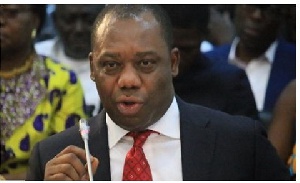 Education Minister, Dr Matthew Opoku Prempeh
Education Minister, Dr Matthew Opoku Prempeh
The argument about SHS at the moment should not be about how to fund it but rather whether it is necessary to use limited state resources to pay fees for every SHS student.
The methods of achieving the objectives of a policy should be one which is well thought through, the selection of the method does not just depend on whether it works but whether it works reasonable and meets its aim at the lowest price possible.
The policy, in my opinion, should adopt a targeting approach and not on a wholesale approach. The central arguments for targeting in terms of public policy are argument of equity and efficiency.
The policy should seek to direct resources to SHS students who ought to have them and denies the students who should not. This will ensure efficiency as it will yield the greatest benefit for the target group at the least possible cost, wasting as little as possible.
A policy like Free SHS is a social policy and cannot adopt the equality principle to allocate equal resources to all students in SHS, such a policy should rather aim at redistributing resources with an objective of bridging the gap between the rich and the poor.
Those in support for the policy the way it stands now argue from the point of law as stated in article 25 (b) which states that; “secondary schools in its forms, including technical and vocational education, shall be made generally accessible to all by every appropriate means, and in particular, by the progressive introduction of free education”, emphasis on free education which is a fundamental human right that should be granted without discrimination, that means a person whose a Ghanaian should benefit from free SHS and therefore some students will be discriminated against if the policy seeks to target a certain portion of the SHS students population.
The question then is, as the country not discriminated against Ghanaian students in the private schools at the basic level? Or should we then extend the free education at the basic school to the private schools? or should the intended Free SHS policy include private SHS.
However, policy analysts distinguish between two forms of discriminations, negative and positive discrimination. I will focus on the positive discrimination because of it an approach that seeks to ensure social justice in the distribution of resources. Positive discrimination refers to actions that seek to alter procedures in order to produce an equitable outcome, people who are at a disadvantage are not made equal by having equal procedure. Positive discrimination will suggest therefore that resource allocation in terms free education at the SHS level should compensate the disadvantage not the privileged.
My argument in support a positive discriminatory Free SHS policy stems from the fact that society in itself is unjust and creates different classes of people. People can have advantage over some just because of where they are born. Countries normally are divided into urban and rural areas where most at times many resources are channel to urban areas than rural areas making life in urban areas more comfortable for urban folks than the rural folks who tend to be poorer. The idea of targeting could therefore geographically focus or “individuality” focused.
The PLOWDEN REPORT in the UK which introduced the term (Positive discriminatory) argued;
“there should be equal opportunity for all, but …. Children in some districts will only get the same opportunity as those who live elsewhere if they have unusually generous treatment….. We ask for “positive discrimination” in favour of such schools and children in them, going well beyond an attempt to equalize resources”
Article 36 (1) of 1992 constitution which talks about the state economic objectives under Direct Principles of State Policy emphasise the possibility of positive discrimination in the implementation of state policies. It states;
“The state shall take all necessary action to ensure that the national economy is managed in such a manner as to maximize the rate of economic development and to secure the maximum welfare…………..and public assistance to the needy”. (Emphasis on public assistance to the needy) The effect of this provision, in my opinion, will suggest that a policy like Free SHS should be implemented in a way that it provides financial support for the needy and not necessarily every SHS student.
Another issue is that subsidies to secondary education are regressive because older families are less poor and the selection of students based on merits to SHS are overwhelming biased to students from the private schools who obtain mostly higher grades than their counterparts from the public schools who mostly obtain lower grades however Subsidies to primary schooling, for example, are progressive because younger families tend to be poorer and the rich mostly prefer the private basic schools to the public one, the opposite is true at the SHS level.
In conclusion, Free SHS policy should be implemented in a way that seeks to provide financial assistance to targeted poor students from deprived areas or an alternative arrangement could be a decentralized fair scholarship system that seeks to provide assistance for needy students. This will ensure access to SHS to all qualified students including the privilege and the under privilege, an objective such a policy attempts to achieve at the lowest cost to the country